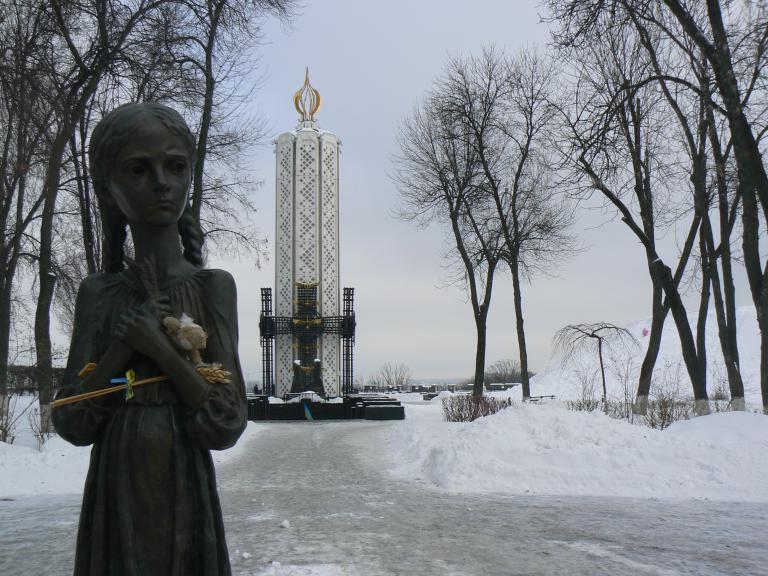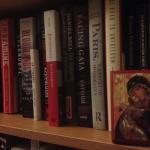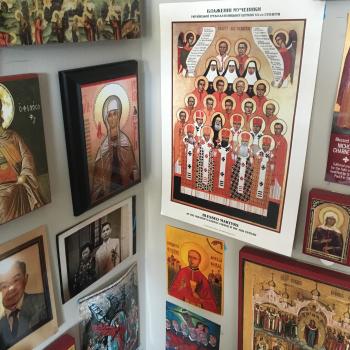
The more fundamental accusation against Holy Josaphat, however, is that he was someone who represented a top-down power imposing uniatism on ordinary folks who didn’t want it, and it is this charge, I feel, that makes it particularly interesting this year that the eve of the feast coincides with the commemoration of the anniversary of the Holodomor, the famine made by human hands in Ukraine in 1932 and 1933. As tied to the figure of Holy Josaphat the Kyivan Church’s spirituality may be, it is also laced with the memory of Stalin taking away the grain of Ukrainian peasants, charging them with being an invented class of kulak peasant landowners, and using the artificial famine to collectivize their farms. Remembering another Stalinist event – the Pseudo-Sobor of Lviv in 1946 that was also instigated by the Man of Steel – our Patriarch recently informed the Bishop of Rome that the greatest act of uniatism was perpetrated by the Soviet Union in forcibly re-uniting Greek Catholics with the Moscow Patriarchate. From our experiences of the Holodomor and the Pseudo-Sobor of Lviv, we are against such impositions from above. Indeed, a proper understanding of what happened on the Maidan in 2013 and 2014 is that Kyivan Church achieved a deeper understanding of her consciousness in the sense that the symphonia of the church does not lie with empire, but with the people themselves. As Patriarch Sviatoslav quoted Pope Francis at the time, the shepherds must smell like the sheep.
That this bottom-up symphonia was achieved by a process of conscientization suggests that it has taken some time for even us in the Kyivan Church to realize that ecclesial coordination with empire can be lethal. A Protestant friend of mine recently accused me of being in a Constantinian church, anti-Constantinianism being all the rage among some young Protestants usually because they’ve read a book or two by Stanley Hauerwas and ignore the fact that John Howard Yoder was a rapist, and I responded that I understand this charge very well. The problem is that empire and nation haven’t worked out well for us either, and when we’ve been on the wrong side of the fence (such as during the Holodomor), people in our church have been murdered for it. We understand the problems of imperialism and nationalism in the church because we have firsthand experience of it instead of pretending that our church is free of them. From such suffering is our social justice consciousness born.
Holodomor is ground zero of that suffering. Worse than the gaslighting that befalls Greek Catholics about Holy Josaphat being a proto-Nazi in Orthodox polemics, the terror of the famine made with hands endures because we are gaslit by both the Left and the Right about what happened at the time. The scholar who coined the term genocide, Raphael Lemkin, names the Holodomor as a Soviet genocide of Ukrainians. That doesn’t stop some from saying that the killing of ‘kulaks’ was ideologically justified, or that Russia somehow has a mysterious right to override the borders of Ukraine in an attempt to establish a ‘Russian World.’ Fr Myron Panchuk was right when he drew out the implications of acknowledging the Holodomor as genocide at a concert in Chicago commemorating the event earlier this year. We must link arms, he told the mostly Ukrainian audience, with Armenians, Palestinians, Jews, Uyghurs, indigenous peoples, and others to denounce the killing of peoples to establish ideological systems. Our symphonia with the people has a clear political implication: we are against genocide of all forms.
What could this insight possibly mean, then, on this Feast of Holy Josaphat of Polotsk? Perhaps I can tell a story. A few months back, we received a brother of ours, Paul-san, from the Latin Church into our Kyivan Church in Richmond. Being in full communion with the Latin Church, the form of reception was ascription, which means that with the Latin and Kyivan bishops agreeing, Paul-san was simply taken in by signing a piece of paper. But for Paul-san, the journey to that moment was a spiritual one, and wanting to acknowledge it, we wanted to give him a liturgical experience. The solution, we discerned, was to offer a moleben to Holy Josaphat of Polotsk, acknowledging our ecumenical union with our sister church while doubling down on our Orthodoxy. At the end of the service, Paul-san then shared what the moment meant to him. He testified that as a Catholic theologian, one of the major emphases of his work was to explore what it meant that Japan after the Pacific War renounced warfare as a means of settling disputes among nations. Like other national empires, the imperial expansion that Japanese fascists had embarked upon in the first half of the twentieth century was framed as liberation, but was genocidal to the core, killing off those who appeared as colonizers and their collaborators.
Is not this pseudo-liberatory genocide, I reflect, the same logic that went behind the murder of Holy Josaphat and the starvation of the ‘kulaks’ in the Holodomor? The church’s symphonia with the people is precisely positioned against such a genocidal orientation. It is to make sure that the people are not manipulated by imperial systems to do their killing for them. Instead of perpetuating a cycle of populist vengeance, the place of the church among the people is to foster a culture of ecumenism, of attentiveness to the oikoumēnē, the common inhabitation that we have on the earth and the ecological justice we must enact if we are to survive together on it. The coincidence of the memory of the Holodomor and the Feast of Holy Josaphat of Polotsk should therefore not be taken as a spiritual accident. It is instead a moment when we in the Kyivan Church might ask for the patronage of the Holy Hieromartyr Josaphat for the works of social justice that we will perform on this earth, bringing together the peoples of the world in a fuller consciousness of how to live together in these commons that we know to be undergirded by the supernatural power of love.












